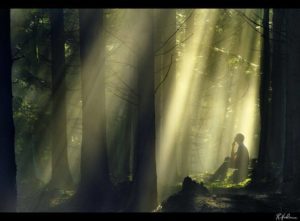
by Joanna Van Der Hoeven
There is a marked increase in the rise people who follow a Druid path and, indeed, all Pagan paths. Why should this be?
In today’s society, we can become so distanced from nature that we feel we need to do something to return to it; something that will connect us once again with the rhythms and flows of life. However, this separation is in itself an illusion that we have created, for we can never be separate as long as we are living and breathing in this world. By mere fact of our existence, by the breath that we share with all other beings on this planet, we have a shared existence and a shared experience. We are never disconnected; we are never truly alone.
The illusion can be very convincing though. It is supported with lifestyles and gadgets that seem to help fund the energy of the illusion. We commute to work on a train with hundreds of people and feel lonely, as everyone is reading a paper, on their phones or listening to their music, shutting out everyone else. For some highly sensitive individuals, this is even a self-preservation technique. We have mobile phones that can connect us with thousands of people anytime, anywhere (apparently) and yet we have very little human interaction with most of them. We live in smaller and smaller family units where interaction with grandparents, cousins, aunts and uncles is ever decreasing for whatever reason – time, distance, etc.
Paganism and Druidy in particular can serve to address this need to reconnect, illusion or no. It can offer us a group of like-minded people who share certain worldviews, or who like to perform ritual a certain way, or support environmental or political causes alongside their spirituality. It may be discussion groups and forums, moots, talks, workshops, camps and retreats that we share and find inspiration in. It is looking for that connecting thread that says we are part of a tribe.
With so many technological advances, someone might be drawn to Druidry to get away from their machines, the hum of electricity and the constant noise in an attempt to return to the natural cycles that are reflected in our environment. Some may be called by poetry of the Romantics, or through historical references or self-actualization. Some may be following their blood lineage of a Celtic heritage, others might feel called by the land upon which they live and use Druidry as the language with which to communicate.
For me personally, the draw to Druidry was in its simplicity. There are so many forms of Druidry, some highly ceremonial, some more ‘mud and blood’. It is to the latter, the experiential Druidry, the simple but not simplistic view of the world and its rhythms and cycles that calls me further in. With no need for magical spells or intricate ceremonies, no regalia or ritual items necessary, just plain and simple communion and communication with nature is what called me. A fondness and easy way with animals and plants almost made the choice for me. Service to the land, the ancestors and the community is the key tenet of my practice, in that order.
More and more, people are choosing to follow a nature-based spirituality. Their reasons may be legion, but love of nature is at the very heart. For me, to be a Druid means not only a love of nature, but service to nature, to the world. We cannot take with abandon – we must give back. We must work hard to protect the things we love from our ever increasingly secular society and its rampant technological advances that do not take into consideration the impact on the rest of the world and indeed, the bigger picture. It is about seeing the sanctity and the sacredness in all things, using the language of Druidry to help us relate.
Druidry is all about the bigger picture. It is about our legacy and what we will leave to our ancestors of the future. It is learning from the past and living fully in the present, mindful of how we live and how we love. It is an ever evolving tradition that works with the talent and energy of the individual in service to the whole.
With the rise of numbers in Druidry, we need to remember this service to the world. It is not only something for us, but something for the entire planet. We do not practice Druidry for our selves, but for the benefit of all. This is not altruistic, merely an outcome of service to the land. In service we grow in our selves, not the other way around. We must look deep within to find our reasons for our Druidry, taking a long hard look at our selves. We must also remember to look outside our selves to the world at large.
We practice, we work, we serve, we step back and regroup in order to practice, to work and to serve. It is a cycle that is represented in the seasons, in the life cycles of everything around us. It is the awen. It is courage. It is Druidry.